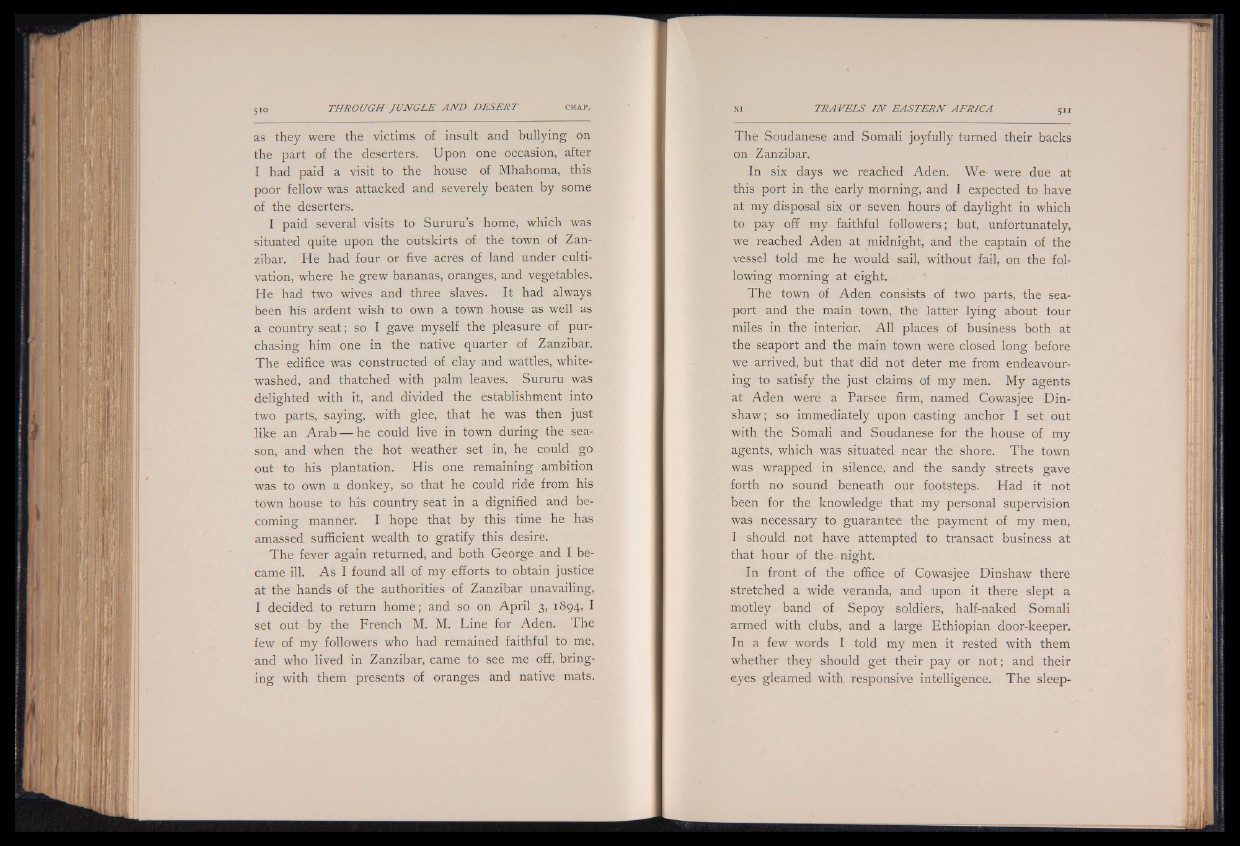
as they were the victims of insult and bullying on
the part of the deserters. Upon one occasion, after
I had paid a visit to the house of Mhahoma, this
poor fellow was attacked and severely beaten by some
of the deserters.
I paid several visits to Sururu’s home, which was
situated quite upon the outskirts of the town of Zanzibar.
He had four or five acres of land under cultivation,
where he grew bananas, oranges, and vegetables.
He had two wives and three slaves. It had always
been his ardent wish to own a town house as well as
a country seat; so I gave myself the pleasure of purchasing
him one in the native quarter of Zanzibar.
The edifice was constructed of clay and wattles, whitewashed,
and thatched with palm leaves. Sururu was
delighted with it, and divided the establishment into
two parts, saying, with glee, that he was then just
like an Arab — he could live in town during the season,
and when the hot weather set in, he could go
out to his plantation. His one remaining ambition
was to own a donkey, so that he could ride from his
town house to his country seat in a dignified and becoming
manner. I hope that by this time he has
amassed sufficient wealth to gratify this desire.
The fever again returned, and both George and I became
ill. As I found all of my efforts to obtain justice
at the hands of the authorities of Zanzibar unavailing,
I decided to return home; and so on April 3, 1894, I
set out by the French M. M. Line for Aden. The
few of my followers who had remained faithful to me,
and who lived in Zanzibar, came to see me off, bringing
with them presents of oranges and native mats.
The Soudanese and Somali joyfully turned their backs
on Zanzibar.
In six days we reached Aden. We- were due at
this port in the early morning, and I expected to have
at my disposal six or seven hours of daylight in which
to pay off my faithful followers; but, unfortunately,
we reached Aden at midnight, and the captain of the
vessel told me he would sail, without fail, on the following
morning at eight.
The town of Aden consists of two parts, the seaport
and the main town, the latter lying about four
miles in the interior. All places of business both at
the seaport and the main town were closed long before
we arrived, but that did not deter me from endeavouring
to satisfy the just claims, of my men. My agents
at Aden were a Parsee firm, named Cowasjee Din-
shaw; so immediately upon casting anchor I set out
with the Somali and Soudanese for the house of my
agents, which was situated near the shore. The town
was wrapped in silence, and the sandy streets gave
forth no sound beneath our footsteps. Had it not
been for the knowledge that my personal supervision
was necessary to guarantee the payment of my men,
I should not have attempted to transact business at
that hour of the- night.
In front of the office of Cowasjee Dinshaw there
stretched a wide veranda, and upon it there slept a
motley band of Sepoy soldiers, half-naked Somali
armed with clubs, and a large Ethiopian door-keeper.
In a few words I told my men it rested with them
whether they should get their pay or not; and their
-eyes gleamed with responsive intelligence. The sleep